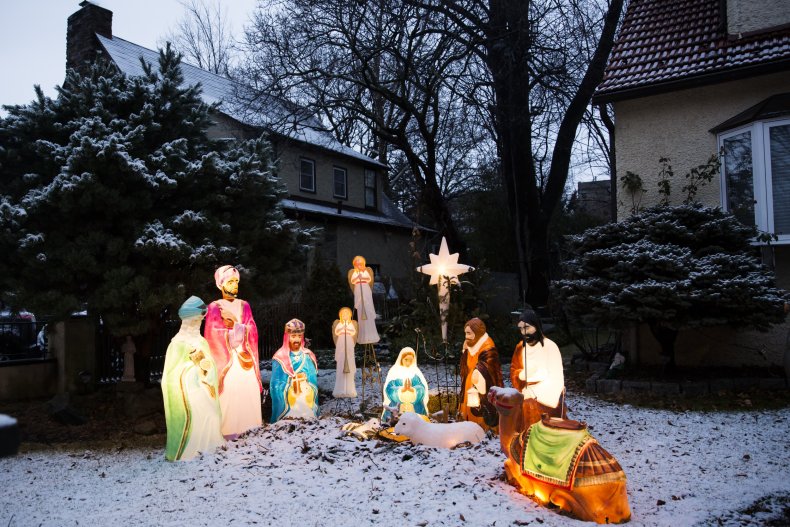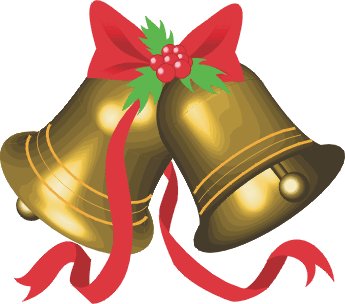“Christmas” is an Old English word, constructed from the combination of two words, namely “Christ” and “Mass”. The first recorded Old English version of the phrase, “Crīstesmæsse,” dates back to 1038, but by the Middle Ages the term had already morphed into “Cristemasse;” a slightly more modern version of the phrase.
The origins
The two separate parts of the word can be traced back to Greek, Hebrew and Latin origins. “Christ” comes from the Greek word “Khrīstos” (Χριστός) or “Crīst,” and there’s a lot of evidence to suggest that the Hebrew word “Māšîaḥ” (מָשִׁיחַ) or “Messiah,” which actually means “anointed,” has also played a considerable role in the construction of the first part of the word “Christmas.” The second part most probably comes from the Latin word, “Missa,” which refers directly to the celebration of the Eucharist.
It is also believed that “Christenmas” is an archaic version of the word “Christmas,” whose origins can be attributed to the Middle English phrase, “Cristenmasse,” which when literally translated becomes, “Christian Mass.”
Christmas… the international holiday
Even though “Christian Mass” or “Christ’s Mass” refers to the annual Christian commemoration of the birth Jesus Christ, “Christmas” is an international holiday which, throughout the ages, has been celebrated by non-Christian communities and been referred to via a variety of different names, including the following:
- Nātiuiteð (nātīvitās in Latin) or “Nativity” means “birth” and has often been used as an alternative to the word “Christmas”
- The Old English word, Gēola, or “Yule” corresponds to the period of time between December and January and eventually became associated with the Christian festival of “Christmas”
- “Noel” is an English word which became popular during late 14th century and which is derived from the Old French term “Noël” or “Naël,” literally translating to “the day of birth”
“Xmas”… modern or ancient?
It’s also worth noting that, even though most people tend to view the abbreviation “Xmas” as a modern bastardisation of the word “Christmas,” “Xmas” is an ancient term and not a grammatically-incorrect modern construction. “X” was regularly used to represent the Greek symbol “chi,” (the first letter of the word “Christ”) and was very popular during Roman Times.
20th December 2019
The term Christmas goes back to 1030, in celebration of when Jesus Christ was born. It comes from Cristes-messe, literally meaning Christ’s Mass. But what about all of the other festive words that appear at this time of year? From Santa Clause to Mistletoe, we have explained etymologies of a few here:
Santa Claus
Santa Claus takes his name from “Saint Nicholas”, the 4th century Greek Bishop of Myra, known for his generous gifts to poor.
Santa Claus himself is a legendary figure, who is said to deliver gifts to the homes of well-behaved children on the night of Christmas Eve or the morning of Christmas Day. He also goes by other names such as Santa and Father Christmas.
Xmas
This abbreviation of Christmas comes from the Greek language. The “X” comes from the Greek letter Chi, which is the first letter of the Greek word Christós (Χριστός), which became Christ in English. There is a common misconception that using “Xmas” instead of Christmas was an attempt to remove Christ from Christmas to eradicate the religious tradition, but there is no proof this is actually true.
Carols
A carol is a festive song sung during religious celebrations. The word carol came from the Old French word carole, a circle dance accompanied by singers. From the 1150s to the 1350s carols were popular dance songs, but nowadays, carols are regarded as songs, mainly Christmas songs.
Mistletoe
The toe in mistletoe is an Old English word for a twig, while the origins of mistle are unknown. Mistletoe is relevant to several cultures. Pre-Christian cultures considered the white berries as symbols of male fertility, with the seeds resembling semen. In the Christian era mistletoe became associated with Christmas as a decoration, under which lovers are expected to kiss.
Gift
Gift means that something is given voluntarily, without a payment in return. In the Old English, gift was a wedding dowry. The meaning of gift as an object freely given to another person emerged in 1200s.
Tinsel
The idea of tinsel dates back to 1610 to a place in Germany called Nuremberg, where people used thin strands of real silver in their trees to reflect candlelight (they used real candles in their trees also). As real silver used to be expensive and tarnish quickly, many alternatives were used over the years. Nowadays, tinsel is made of PVC which is treated to make it shiny, before it’s shaped into bands and produced in a tinsel machine.
Rudolph (Rudolf)
We know Rudolf as Santa’s reindeer, but the name actually means” famous wolf” and is a boy’s name in German.
Poinsettias
Poinsettia is a plant with large, red leaves, popular at Christmas and widely used as a Christmas floral display. They are native to Central America and were named after Joel Robert Poinsett, an American diplomat, who introduced the plant to the United States in the early 1820s.
It’s hard to imagine a time when the Christmas holiday wasn’t referred to as Christmas, but it wasn’t always the name for the celebration marking Jesus’ birth.
On Wednesday, family and friends will gather in homes across the globe to share good tidings and exchange gifts in honor of the Christmas holiday. Oftentimes, loved ones will share a meal and since the holiday is one of the most important for those observing the Christian faith, some people attend church services either on Christmas Day or the night before on Christmas Eve.
Church officials started celebrating Jesus’ birth in the fourth century, according to History.com, and Pope Julius I chose December 25. The Bible doesn’t mention the date of Jesus’ birth and there’s debate as to when it actually took place. Some point to the shepherds’ presence to argue that it was likely spring since that’s when they herd, and others claim the stars depicted in the sky indicate it was a summer birth.
By the time the church decided to celebrate Jesus’ birth, there were already a number of festivities that marked the winter solstice, including the pagan Saturnalia festival. It’s possible Pope Julius I chose December 25 because if it was surrounded by other holidays, it was more likely to be embraced.
Initially, Jesus’ birth celebration was called the Feast of the Nativity and was celebrated in England by the end of the sixth century, according to History.com. The first known use of Christmas, according to Merriam-Webster, was before the 12th century and originates from Middle English’s Christemass meaning «Christ’s mass.» Mass in Old English, according to Dictionary.com, references a church service.

Amir Levy/Getty
Encyclopedia Britannica explained that the term «Christmas» is of «fairly recent origin,» and Dictionary.com reported the Christ part of the word Christmas derived from the Greek word Chrīstos, spelled Χριστός in Greek. This explains why people abbreviate Christmas to Xmas.
The first letter of Christos (Christ) in Greek is Chi, appearing as the letter «X» in English. X was first used to abbreviate Christ in the mid-1500s, according to Dictionary.com.
While Navidad in Spanish, Noel in French and Natale in Italian probably denote nativity and directly relate to Jesus’ birth, according to Encyclopaedia Britannica, the common Christmas phrase, «Yule,» likely has more to do with the winter solstice.
By the 900s, Germanic people celebrated Yule, a 12-day pagan festival, in December and January around the winter solstice. Anyone who’s heard the song «Have Yourself a Merry Little Christmas,» probably recognizes the word «yuletide,» as in the line preceding «next year all our troubles will be miles away.»
Although not initially used to reference the season around Jesus’ birth, Dictionary.com reported the word «Yuletide,» can be used to describe the Christmas season.

После текста вы найдете Рецепт рождественской индейки
(текст на английском языке)
To begin with, Christmas is a religious holiday. The word Christmas means Christ’s Mass that is the celebration of the birth of Jesus Christ. That is why many people go to church on that day. Christmas is celebrated in all countries but in a different way. In Europe it is celebrated on the 25th of December.
As usual people decorate their houses and light candles on the Christmas Eve. There is a tradition to decorate the Christmas tree with baubles, glass balls, toys and tinsel. It started in Germany in the 16th century.
The legend says that Martin Luther, an important Christian leader, was walking home through the forest one Christmas Eve. Suddenly he looked up and saw a beautiful starlit sky. The stars looked like as if they were shining on the fir tree branches. When he came home, he put a small fir tree inside his house and decorated it with lighted candles. In England this tradition was introduced by Prince Albert, the German husband of Queen Victoria.
The English people also hang mistletoe on the doors of their homes. They believe that this plant has magical powers. It can help peaceful and friendly people come in and keep out witches or evil spirits. They put presents under the Christmas tree and still hang stockings at the bedside of their children. The Father Christmas is sure to come at night through the chimney.
In the old times in England people in the streets sang Christmas Carols. The most famous is O Holy Night.
Перевод текста «The Origin of Christmas» с английского в самом конце.
* * *
The Receit of Traditional Christmas Roast Turkey

- One turkey
- 30 g butter, melted
- 200 g cooked rice
- 200 g minced pork
- 2 large onions chopped
- 1 large carrot grated
- 1 /2 bunch parsley, chopped
- Juice of 1/2 lemon
- 100 g sultanas
- One big sour apple
- Salt and pepper to taste
Frozen turkey must be thoroughly thawed before cooking in a cool place. Do not thaw the bird in the refrigerator or in hot water.
Wash the turkey under cold running water, then pat dry with absorbent kitchen paper.
Place all the stuffing ingredients in a large bowl and mix well.
Fill the turkey with 1 /3 of the stuffing. Do not pack tightly or the skin may split during cooking. Shape remaining stuffing into little balls, stew them.
Truss the turkey.
Place the turkey in a large roasting pan. Brush all over with melted butter and season with salt and pepper. Roast in oven for 2y4 — 23/4 hours.
Remove trussing strings and place the turkey on a dish. Arrange stuffing balls and herbs around the turkey.
Рождественская жареная индейка, фаршированная рисом и овощами (Традиционный рецепт)
- Большая индейка
- 30 г масла, растопленного
- 200 г отварного риса
- 200 г свиного фарша
- 2 большие луковицы
- 1 большая морковь
- 1/2 пучка петрушки, мелко нарубленной
- Сок 1/2 лимона
- 100 г изюма без косточек
- 1 большое кислое яблоко, очищенное и с вырезанной сердцевиной, разрезанное на мелкие дольки
- Соль и перец по вкусу
Разморозить индейку в прохладном месте в течение 20-30 часов, но не в холодильнике или в теплой воде. Промыть ее холодной водой, затем вытереть кухонным бумажным полотенцем.
Положить все ингредиенты для начинки в большую миску и хорошо перемешать.
Нафаршировать индейку 1 /3 начинки. Не кладите начинку слишком плотно, иначе кожица индейки может лопнуть при жарке. Остальную начинку разделайте в виде тефтелей и потушите их отдельно. Свяжите крылышки и ножки птицы.
Положить индейку на большой противень, сбрызнуть маслом, посыпать солью и перцем. Жарить в духовке 2’/4 — 23/4 часа.
Убрать нитки, положить индейку на блюдо, вокруг нее тефтели и зелень.
* * *
Перевод текста про Рождество (Christmas)
[paid_content product_id=»18″]
Начнем с того, что Рождество, это религиозный праздник. Само слово Рождество означает празднование рождения Христа. Вот почему многие люди в этот день идут в церковь. Рождество отмечают в разных странах по-разному. В Европе Рождество отмечают 25 декабря. Обычно люди украшают свои дома и в рождественский вечер зажигают свечи. Существует традиция наряжать елку на Рождество. Она зародилась в Германии в 16 веке. По легенде Мартин Лютер, известный религиозный проповедник, однажды в рождественский вечер шел домой через лес. И вот он взглянул вверх и увидел прекрасное звездное небо. Звезды были видны сквозь ветви елок, казалось висели на них. Когда проповедник пришел домой, он взял маленькую елочку и украсил ее зажженными свечами. Из Германии этот обычай украшать елку привез в Англию принц Альберт, муж королевы Виктории, немец по происхождению.
В Европе и особенно в Англии, еще есть обычай в рождественские дни вешать омелу на дверь. У этого растения, по поверьям, есть магическая сила. Оно впускает в дом добрых людей и держит подальше от вашей двери злых людей и нечистую силу. Также на Рождество люди вешают чулки у изголовья кровати своих детей. Дед Мороз обязательно придет, чтобы положить в них подарки.
[/paid_content]
Еще читайте или смотрите:
Nativity of Christ Jesus
“The word for Christmas in late Old English is Cristes Maesse, the Mass of Christ, first found in 1038, and Cristes-messe, in 1131. In Dutch it is Kerst-misse, in Latin Dies Natalis, whence comes the French Noël, and Italian Il natale; in German Weihnachtsfest, from the preceeding sacred vigil.” ~ Catholic Encyclopedia (1913)
“Christmas (i.e. the Mass of Christ), in the Christian Church, the festival of the nativity of Jesus Christ.” ~ 1911 Encyclopædia Britannica
“Christmas (krĭs′ mas), the day on which the birth of Jesus Christ is observed. The first certain traces of the festival are found about the time of the Emperor Commodus (180–192 A. D.). In the reign of Diocletian a churchful of Christians, gathered to celebrate Christmas, were burned by order of the emperor. The birth was celebrated in May, April and January by the early Christians. It is almost certain that the 25th of December is not Christ’s birthday, as it is the rainy season in Judæa, and shepherds could hardly be watching their flocks by night in the plains at that time. The present date came to be used probably because all heathen nations celebrated that season with great festivities, as the old Norse Yule-feast. The beautiful Christmas carols at first were manger-songs, telling the story of Christ’s birth. The Christmas-tree with its hanging toys was a custom borrowed from the Romans, and is told about by the poet Vergil. The visit of Santa Claus bearing gifts belongs properly to December 6, the festival of St. Nicholas.” ~ The New Student’s Reference Work (1914)



